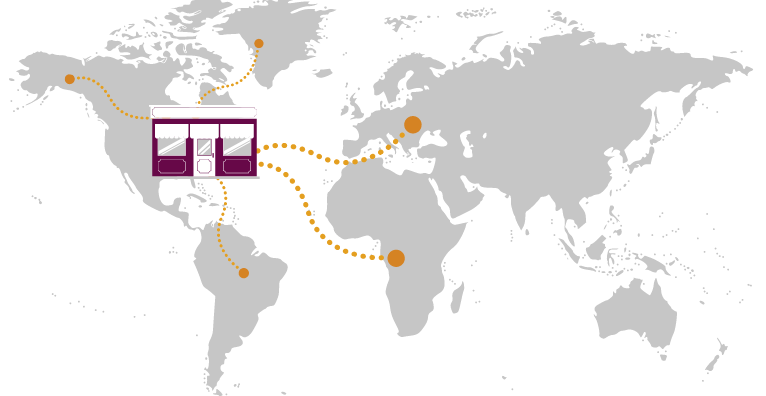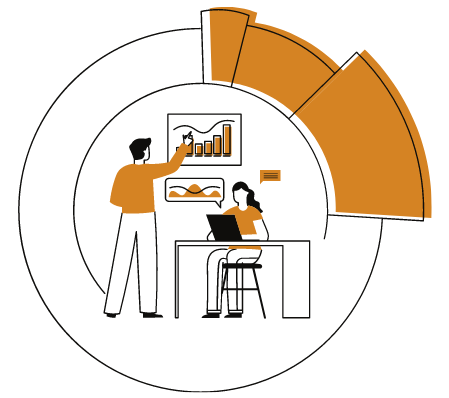
Subscribe to our newsletter!
We don't spam. You will only receive relevant and important tips for you and your business.
Unsubscribe anytime.
No matter what industry a business is in, digital marketing is absolutely necessary.
Digital marketing is an umbrella term for marketing efforts that involve the internet, including search engine optimization (SEO), search engine marketing (SEM), pay-per-click ads (PPC), social media, content marketing, email marketing, and video.

Digital marketing isn’t all that different from traditional marketing; it just requires different tools. Marketing has always been about finding and connecting with your audience, meaning you need to meet them where they already are. Today, there are over 4.33 billion active internet users worldwide, so your customers are most likely online.
Digital marketing is an extremely profitable practice, however, there are many misconceptions that hold small business owners back. Those that are slow to adopt digital are missing out on vast opportunities for growth, exposure, and revenue.

Digital marketing is probably the most effective method for a small business to grow. While large companies were able to dedicate more resources to advertising in the past, small businesses are now able to compete with the advantages that large companies traditionally held over them.

Small businesses are also able to compete for quality results on a small advertising budget. When managed effectively, businesses can control exactly where and how money is spent within their digital marketing strategy.
Unlike traditional marketing, digital marketing is trackable. Through tools like Google Analytics, social analytics tools, and more, businesses are able to gather analytical data and use it to make better-informed decisions. With this accessible data, small businesses can gather important insights about consumer behavior without performing traditional market research. This allows businesses to experiment with different tools to find what works.

With the rise of the online consumer, digital marketing has become a necessity for any business strategy. It is a brand’s main point of interaction with consumers and vital for brand awareness. Most consumers form their first impressions of brands on the internet. According to the Pew Research Center, three in 10 American adults say they are ‘almost constantly’ online, and 81% say they go online on a daily basis.

Consumers expect digital content as a way to learn about brands. Digital marketing is necessary to raise brand awareness, share your message, and aid in the consumer journey. Without effective digital marketing strategies in place, businesses will miss out on exposure, leads, and sales.


Chances are, if your competitors aren’t online, they will be soon. Stay ahead of the curve and take advantage of the digital space. It will only benefit you to capitalize on their mistake and take advantage of the opportunity to convert consumers without the threat of competition.
Also, your digital competitors may not be who you think they are. Most times, there's a disconnect between traditional competition and digital competition. Even if your traditional competitors aren’t online, you may not realize that the real digital competition is.
Some people mistakenly think that their customers just aren’t online. Rest assured that no matter what industry your business is in, your customers are online. Don’t be fooled into thinking that your product or service is “too boring” to profit from digital marketing. When the right message is targeted to the right audience, it will be received. It’s only a matter of figuring out how to reach your audience.

Mobile optimization is the process of optimizing your website for visitors on all devices. It factors in site design, site structure, page speed, and more to account for different screen sizes and load times.

Ultimately, it all comes down to friction. Friction occurs when there is a barrier to conversion, such as slow page speed. The more friction on a website, the more likely a user is to leave. According to research by Google, 53% of mobile users will leave a site that takes longer than three seconds to load.

The goal of digital marketing is to attract quality leads, not as many visitors as possible. A digital marketing campaign should be focused and targeted to the specific consumers interested in your products or services. While you can work to attract hundreds of visitors to your site each day, they won’t convert if they aren’t looking for your products or services.

No matter the amount of website traffic you receive, your goal should always be to reach the users that are more likely to convert.

Search engine optimization (SEO) is the process of optimizing your website so that search engines will recognize it as authoritative and relevant to users. It’s vital for a website’s success, but it’s still somewhat of a foreign concept to many business owners.
Like any other business strategy, SEO requires more than just maintenance. Search engine algorithms are constantly evolving, competitors are coming and going, and changes must be made to make sure you don’t miss out on ranking opportunities.
Google uses Googlebot, a web crawling software, to find and collect information on the internet to add to its index. This information is used to update its search results. How often Google crawls your site is based on links, page rank, and crawling constraints. These regular crawls result in changes to the search engine results pages (SERPs), which display soon after the index is updated. Sites with high-quality content will get crawled more frequently, so if your site gets few visitors, Googlebot won’t crawl your site as often.
Because Google is constantly crawling the web to update its SERPs, you have to keep your site content up-to-date to make sure you maintain your SEO ranking.
Looking for digital marketing help?